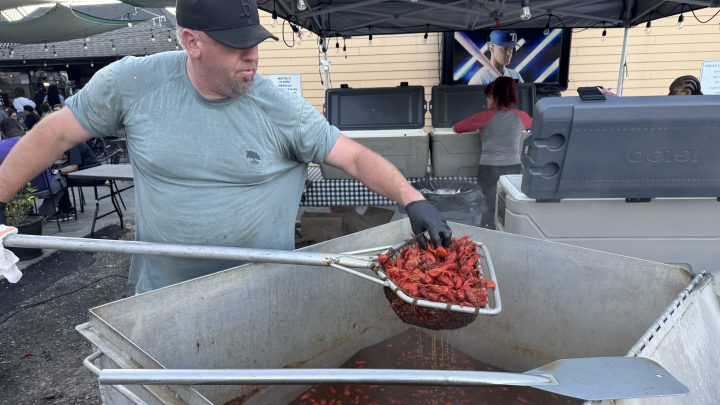
Record heat, drought decimate Louisiana’s beloved crawfish season
Record heat, drought decimate Louisiana’s beloved crawfish season

This year has been particularly bad for one of the deep South’s most prized exports: crawfish.
The tiny lobster-like crustaceans are a $500 million industry that supports thousands of jobs, restaurants and farming communities. But a changing climate in the deep south has thrown off the seasonal crawfish-to-boil pipeline.
Farmers are bringing in less than half the catch that they normally would. That’s a threat to jobs and a way of life for some in the South.
In a crawfish pond outside of Baton Rouge, Louisiana, Mitch Olivier wades through stalks of rice plants. His eyes are set on a metal trap poking out of the water.
Olivier, a farmer, lifts up the trap. But the cage is empty. Even the bait — a severed fish tail — is still in it.
“Nothing,” he said. “It just goes to show you how little crawfish they have this year.”
Usually by March, Olivier would be hauling hundreds of pounds of mudbugs, as they’re also called, out of this pond. But a record heat wave last summer, paired with a drought through the fall, dried out this field. That caused the baby crawfish to burrow so deep into the mud below that they haven’t really emerged yet.
The few that have emerged are often far from his traps, he said.
“And so the ones that did come out of their little holes, they probably were just content sitting in the mud,” Olivier said.

Olivier said he’ll be lucky to make half what he does in a typical year. And he’s not alone. Farmers across Louisiana estimate their industry will see a $140 million loss this year due to last summer’s extreme heat and drought. He said the state is talking about ways to keep water in crawfish ponds during future droughts.
“We can’t control the weather, but we can maybe try to keep the ground a little damper and see if that helps,” he said. “I don’t know. It’s tough.”
So tough, in fact, that Louisiana’s governor just issued a disaster declaration for the industry. The Biden administration has considered sending aid to farmers. Meanwhile, there’s still high demand for crawfish across Louisiana — and that’s sent prices soaring.
Crawfish boils are a way of life in the state. At a crawfish boil at the Bayou Beer Garden in New Orleans, Andry DeGrange lists the ingredients in his personal recipe.
“It’s lot of paprika, a lot of cayenne, a lot of garlic. A lotta onion, citrus,” he said, stirring a crawfish-filled vat with with a giant metal ladle.
DeGrange writes the price for one pound of boiled crawfish on a chalkboard sign in front of his boil pot. This year, it’s the highest it’s ever been.
“Normally this time of year, you would get crawfish about $6 per pound, so you might (be able to buy) three pounds for 18 bucks with all the sides,” he said. “This year we’re doing one pound for $19, and it’s still not really profitable.”
It’s not profitable because the cost of labor, seasonings and equipment has all gone up too. The one thing helping DeGrange break even, he said, is the long line of crawfish fans who come here to eat. He said customers have been understanding about that $19 sticker price.
“I’ve kind of done what I’ve always done and been very nice to people and tried to explain to them that, ‘Hey, prices are high. We’re charging a little more than we used to,’” he said. “And just trying to have good customer service and hope for better days.”

It’s possible that the season is late and the crawfish catches will be bigger in a few weeks. If not, DeGrange said he’ll have to try shrimp boils or look into another industry altogether.
But losing a crawfish boil would be devastating to local communities. For many, they’re a gathering place.
One of DeGrange’s customers, Bradley Baudot, just finished work and texted his friends to meet up. He’s a regular at this boil. Maybe too regular, he said.
“I probably come like two days a week right now. Maybe three,” he said. “My sodium levels are going to be through the roof, but, hey, that’s what doctors are for.”
He just loves it. And the higher price hasn’t scared him off. “I’m not going to buy crawfish anywhere else,” Baudot said. “I know what I’m paying here and I know I’m getting good quality, so I don’t mind paying for it.”
So as long as DeGrange, the chef, is boiling, he’s coming.
There’s a lot happening in the world. Through it all, Marketplace is here for you.
You rely on Marketplace to break down the world’s events and tell you how it affects you in a fact-based, approachable way. We rely on your financial support to keep making that possible.
Your donation today powers the independent journalism that you rely on. For just $5/month, you can help sustain Marketplace so we can keep reporting on the things that matter to you.












